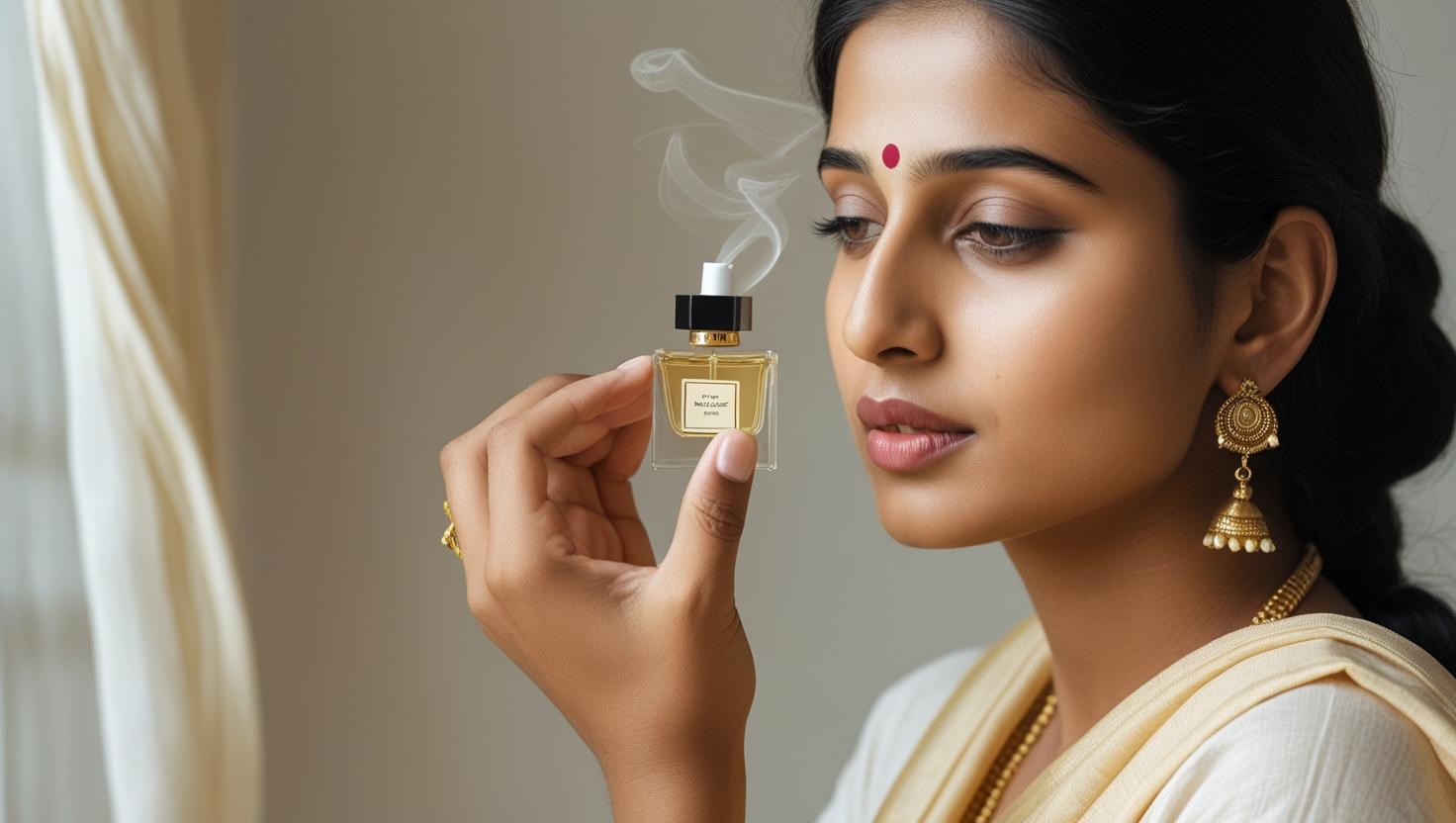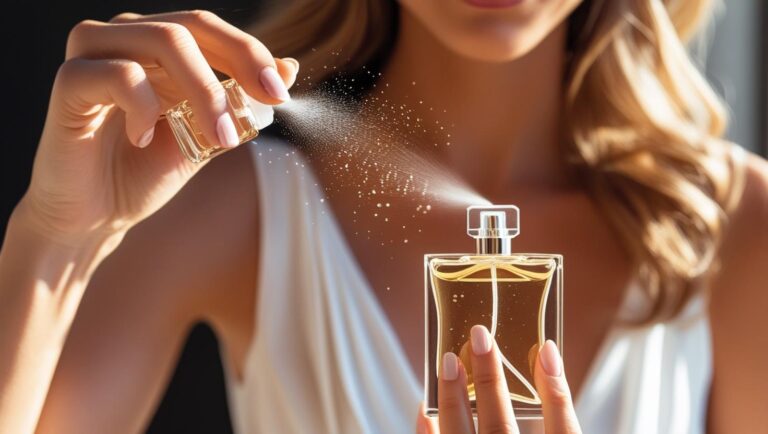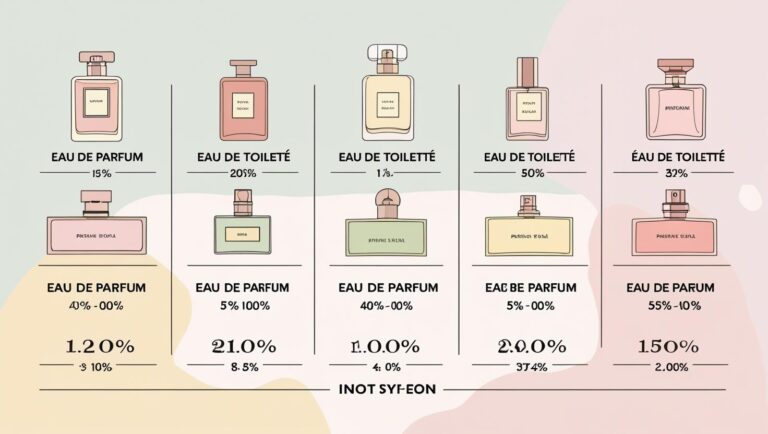How Skin Chemistry Influences Perfume Scent

Does your favorite perfume smell different on you than it does on someone else? That’s because your skin chemistry plays a big role in how fragrances react. Everything from your pH level to natural oils affects the way aromas develop on your skin.
Stick around—this guide will explain why and help you make better perfume choices!
Key Takeaways
- Skin pH and natural oils influence how perfume smells. Acidic skin may enhance musky notes, while dry skin makes scents fade faster.
- Hormones, diet, and skincare routines affect fragrance performance. Spicy foods or stress can change how perfumes project.
- Oily skin holds fragrances longer but may alter top notes. Dry skin absorbs scents quickly, needing more reapplication.
- Always test perfume on your own skin before buying. Scents develop differently based on body chemistry.
- Moisturizing helps perfumes last longer on dry or flaky skin by creating a smooth surface for even scent projection.

Key Factors of Skin Chemistry That Affect Perfume Scent

The way perfume smells on your skin isn’t random—it’s tied to your body’s natural chemistry. Your oils and pH levels can shift how a fragrance develops, making it smell different from person to person.
Skin pH Levels
Skin pH can shift perfume scents. Acidic or alkaline skin affects fragrance molecules. People with acidic skin may notice citrus notes fade faster, while woody or musky base notes linger longer.
pH levels range from 4.5 to 6 on most skin, but factors like diet and lotions can change this balance. Spicy foods and meat consumption might lower the pH. Next up, natural oils play a key role in how perfumes react with your body chemistry!
Natural Skin Oils
Natural oils on your skin interact with fragrance molecules. These oils can either amplify or weaken certain notes, like citrus or spicy tones. Oily skin often holds perfumes longer, enhancing the base notes such as musks or woods.
Dry skin absorbs parfums faster, causing scents to fade quickly.
Perfume performance also changes with oil levels. People with less natural oil may notice weaker fragrance projection and shorter staying power. Moisturize before perfume application to balance this effect.
Perfumers design eau de toilettes expecting biochemistry differences in users’ oily or dry skin types.
Skin Type and Texture
Oily skin can make perfume stronger but shorter-lasting. The natural oils mix with fragrance molecules, boosting projection at first. Dry skin, on the other hand, absorbs odorants quickly, causing lighter scents to fade faster.
Perfume applied topically may need more reapplication on dry areas.
Rough or flaky skin impacts how evenly a scent spreads. Smooth textures allow fragrances to linger and blend better with body chemistry. Using moisturizers before applying citrus notes or base notes can help perfumes last longer regardless of your skin type.
External Influences on Skin Chemistry
What you eat and how you live can change your skin’s chemistry. These shifts might make a scent smell stronger, softer, or even different on your skin.
Diet and Lifestyle
Spicy foods can heat your body, changing how fragrance molecules react on your skin. A diet rich in vegetables and fresh produce may help keep your biochemical balance steady, offering smoother perfume performance.
Oily skin, caused partly by fatty or processed foods, holds scents longer but might alter top notes or base notes unexpectedly.
Stressful lifestyles and lack of sleep disrupt hormones, which impact the way perfumes smell on acidic skin or dry skin. Even a hungover day can make fragrances project differently due to dehydration.
Skincare routines also matter; fragrant oils layer better on moisturized surfaces than rough textures.
Hormonal Changes
Shifts in hormone levels can change how a perfume smells on your skin. For example, during pregnancy or menstruation, hormones like estrogen and progesterone fluctuate. These changes can affect your body chemistry by altering skin pH levels and the production of natural oils.
A slightly acidic skin may make citrus notes pop, while floral base notes could feel muted.
Stress also triggers hormones like cortisol, which may increase oily skin for some people. More oil on the skin enhances fragrance projection but might distort lighter top notes like those found in Chanel No.
5. Hormonal imbalances from conditions like thyroid issues can also alter how perfume molecules interact with your vomeronasal organ—impacting how you perceive scents altogether!
Tips for Finding the Right Perfume
Perfume smells different on every person because of body chemistry. Test it on your own skin to see how it reacts before making a choice.
Test on Your Skin Before Buying
Testing a perfume on your skin is vital. Fragrance reacts differently depending on body chemistry.
- Spray the perfume on your wrist or inner arm. These spots warm up the fragrance molecules, showing how it blends with your skin oils and pH level.
- Allow at least 15 minutes for the scent to develop. Top notes fade quickly, but base notes linger and reveal the full character of the fragrance.
- Test only one or two perfumes per visit to avoid overwhelming your nose. Smelling too many scents can dull your ability to assess them accurately.
- Avoid rubbing your wrists together after spraying. This action breaks down fragrance molecules and alters how it smells.
- Wear it throughout the day before deciding if it suits you. Some perfumes perform better over time due to projection or interaction with oily or dry skin types.
- Check how it smells in different environments, like outside or indoors. Humidity and air can affect perfume performance.
- Consider testing during various seasons, as climate influences a scent’s behavior on your skin.
- Pay attention to any irritation, especially if you have sensitive skin types or an acidic pH level that may react poorly with certain ingredients.
Experiment With Fragrance Families
Testing different fragrance families can help you find scents that fit your skin chemistry. Each family offers unique notes and perfume performance.
- Floral scents are soft and sweet. They often have rose, jasmine, or peony notes. These work well on dry skin as they last longer.
- Citrus notes are fresh and energizing. Scents like lemon, orange, and bergamot brighten your mood and suit oily skin types due to their lightness.
- Woody fragrances feel deep and warm. Sandalwood, cedarwood, and patchouli work great on acidic skin, giving a rich base note projection.
- Spicy options add boldness with cardamom or cinnamon. They linger better on hydrated, smooth skin textures.
- Gourmand perfumes smell edible with hints of vanilla or tonka bean. These complement balanced pH levels as they develop evenly over time.
Experimenting lets you see how fragrance molecules react with your body chemistry!
Factors to Consider Before Buying Perfume
Finding the right perfume can feel tricky. Your body chemistry plays a big role in how it smells on you.
- Test Perfume on Your Skin
A scent changes once it touches your skin. It interacts with your skin pH and natural oils, making it smell different than in the bottle. Try perfumes on your wrist and let them settle for at least 30 minutes to experience top notes and base notes fully. - Consider Your Skin Type
Oily skin tends to hold fragrance longer, while dry skin may make scents fade faster. If you have dry skin, try moisturizing before applying perfume for better performance. - Think About Weather
Perfumes react differently depending on heat or cold. Citrus notes work well in summer, as they’re light and refreshing. Warmer, spicy fragrances are better suited for colder months since they last longer in cool air. - Check Its Longevity
Not all perfumes last hours on end. Look for “eau de parfum” if you want a scent that sticks around all day, while “eau de toilette” is lighter for shorter wear times. - Match Fragrances to Occasions
Some perfumes are bold and ideal for parties or evening outings, while others feel subtle enough for work or day events. Test what fits your lifestyle best. - Pay Attention to Ingredients
Fragrance molecules such as florals or musks can behave differently based on acidic skin levels or even what you ate recently—spicy foods might alter how scents project from your body! - Trust Your Nose Over Trends
Trendy names like Francis Kurkdjian might catch your attention, but pick what smells good to you. Perfume is personal; the perfect match will always suit your mood and chemistry best.
Each spray tells a story—make sure it’s one you’ll love!
Conclusion
Perfume reacts with your skin like a secret recipe. Your pH, oils, and texture all play a role in how it smells. No two people wear the same scent alike—it’s part science, part magic.
Test perfumes on yourself to find that perfect match. The right fragrance isn’t just about smell; it’s about chemistry too!
FAQs
1. How does skin chemistry affect perfume scent?
Skin chemistry, including your pH level and oiliness, changes how fragrance molecules react on your skin. This can alter the way a perfume smells compared to how it smells in the bottle.
2. Does oily or dry skin impact perfume performance?
Yes, oily skin holds onto scents longer because it binds better with fragrance molecules. Dry skin may make perfumes fade faster.
3. Can spicy foods change how a perfume smells on me?
Spicy foods can influence your body chemistry and even make your skin more acidic, which might shift how certain notes like citrus smell on you.
4. What is fragrance layering, and why does it matter?
Fragrance layering involves combining multiple scents or products to enhance projection and longevity of a perfume while complementing your natural skin type.
5. Why should I test perfumes before buying them?
Perfume testing lets you see how fragrances interact with your specific pH level and body chemistry since not every scent works for everyone’s unique makeup!





